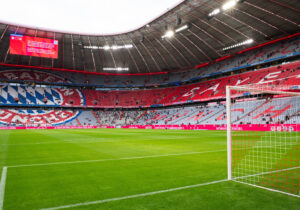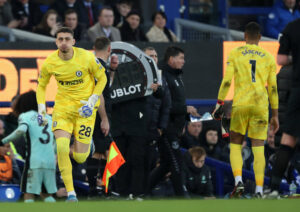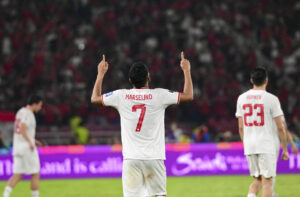Joachim Löw will step down as head coach of the German national team after the European Championship in the summer of 2021.
The 2014 World Cup winner asked to end his contract, which was set to expire after the 2022 World Cup in Qatar, upon completion of the Euros. The German Football Association (DFB) has agreed.
“I take this step very consciously, full of pride and enormous gratitude, but at the same time continue to be very motivated when it comes to the upcoming European Championship tournament,” Löw said in a statement on the DFB website.
Löw joined Die Mannschaft as an assistant to Jürgen Klinsmann back in 2004 and was on the bench for the Germans’ third-place finish at home in the 2005 FIFA Confederation Cup and once again in the 2006 World Cup. He has gone on to win 120 matches with the club, win a 63.5 win percentage.
Joachim Löw to Leave German National Team
A Decade of Dominance begins
After Jurgen Klinsmann decided not to renew his contract in the summer of 2006, Löw was promoted to the managerial position and given a two-year contract. Over the course of the next 16 years, Löw turned the Germans into a perennial contender at almost every competition in which they played.
He was also responsible for bringing through a new generation of German talent that included the likes of Jerome Boateng, Toni Kroos, Philipp Lahm, Thomas Müller, Manuel Neuer, Mesut Özil, Lukas Podolski and Bastian Schweinsteiger, among others.
“It is something very special and an honour for me to be involved in my country,” he said. “And because I have been able to work with the best footballers in the country for almost 17 years and support them in their development. I have great triumphs with them and painful defeats, but above all many wonderful and magical moments.”
The magic started right away for Löw. In his first tournament with the team, his side finished as the runner up, narrowly losing 1-0 to Spain in the final of the 2008 European Championship.
He followed this performance up with a third-place finish at the 2010 World Cup and, two years later, lost in the semi-finals of the 2012 European Championship.
Joachim Löw and His Historic World Cup Win
At the 2014 World Cup in Brazil, the stars aligned for Germany. Brazil were heavy favourites at the onset of the tournament and all the European sides arrived in Brazil with the knowledge that a European team had never won a World Cup in the Americas.
Germany topped Group G, collecting two wins – including one over the United States national team led by his former boss Klinsmann – and a draw. Die Mannschaft went on to scrape past Algeria 2-1 after extra time in the round of 16, before edging out France 1-0 in the quarter-finals and arriving in the semis against Brazil.
On July 8, in Belo Horizonte, Löw and his star-studded, well-drilled German side thrashed the Brazilians 7-1 – the biggest defeat for the Brazilians since 1920 – and one that is still painfully emblazoned into the national psyche to this day. Next up, was Argentina in the finals.
Argentina had the better of the chances throughout the 90 minutes of regular time, but Germany broke the deadlock with seven minutes remaining in extra time and Löw lifted the World Cup trophy, Germany’s fourth world championship and its first since 1990.
After the Highs, Jogi Hits New Lows
Two years later, Germany once again offered a strong showing at the 2016 European Championship, losing to France 2-0 in the semi-finals despite looking the better side for much of the match.
The following year, Löw took a substantially younger team to the 2017 FIFA Confederations Cup and easily won the tournament, picking up his 100th managerial win in a 3-1 win over Cameroon in the final match of the group stage.
Heading into the 2018 World Cup, Löw extended his contract until 2022, about one month before his team launched one of the worst title defences in World Cup history.
Die Mannschaft lost the opening match 1-0 to Mexico before coming back to beat Sweden 2-1. An embarrassing 2-0 defeat to South Korea in the final match saw the side eliminated from the group stage for the first time since the single-group format of the tournament began in 1982.
Things did not get much better after a public feud with superstars Thomas Müller, Mats Hummels and Jerome Boateng saw two of the side’s most experienced and influential players exiled from the team.
Germany’s poor form continued into the newly-inaugurated UEFA Nations League, finishing at the bottom of their group and only saved from relegation by a reformatting of the tournament.
In the second edition of the competition, Löw led his side to their worst defeat since 1931, receiving a 6-0 thrashing at home to Spain, although the side finished second in the group.
Could the Euros Be Löw’s Redemption?
Interspersed in the UEFA Nations League disappointments, Joachim Löw reliably guided Germany to the top of its qualification group for the 2020 European Championship. Luckily for him, many of his preferred players remain in top form ahead of the tournament.
A combination of COVID-19 and sporadic injuries caused by an extremely compacted season-and-a-half means the tournament will likely be as unpredictable as the rest of 2021 has been too. This means the side has one last chance to claim an elusive European title under Löw.
“I know that Jogi’s full concentration and energy in the coming weeks and months will only be used to prepare for the European Championship,” Oliver Bierhoff, the national team director said on the DFB website.
“This team and its players have developed incredibly with him. I regret that our professional paths will separate after the Euro,” he concluded.
Main Photo






